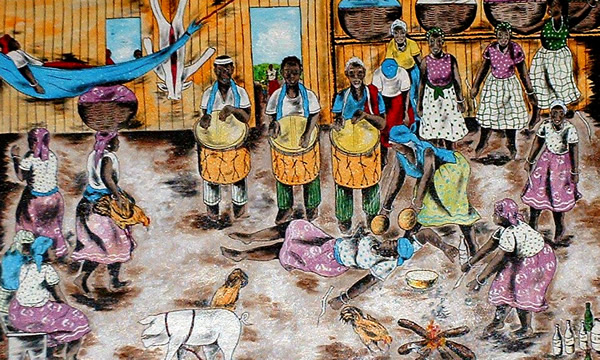
Listening to many Garifuna songs, they are very up-tempo. My Scottish indie-rock loving music tastes assumed that they must therefore be quite cheerful – maybe about catching lots of tasty fish a particular day. But that’s not how Garifuna music works – there is a particularly up-tempo Garifuna punta song that is all about when Hurricane Hattie almost completely destroyed many towns and cities in Belize:
Wa ba bumalali, Sili, lanarime dan
(You’ve raised your voice, Syl, how terrible the storm).
Wa ba bumalali, nirüa
(You’ve raised your voice, my child.)
Nabugu yali ubüu
(The earth has been brought low)
Wa wama ferudun, wonweguü yebe
(Let us beg forgiveness, we nearly died)
Larugan aningira hüruha ubüu
(At dawn the earth lay in sadness)
Laramaüahandügü wagüa, giüngiuüahündügü wagüa
(We could only stand around, just sucking our teeth).
Higüu waban? Barüla Hati
(Where is our house? Hattie has taken it)
Garifuna people believe in ancestral spirits, and that their ancestors continue to talk to them and guide them after death. For this reason, death is not considered such a sad time, and the wake of a well-known Garifuna person in PG is one of the biggest parties to be found in any given year, with all night drumming, dancing and singing (plus a little gambling to round things off).
The most important cultural ceremony that the Garifuna conduct is the Dugu, a large ceremony that takes place in the local Garifuna temple that can last over a week – I was honoured enough to attend 24 hours at one of Ray’s family’s dugu. A Dugu is held whenever there is some kind of trouble in the family, and the ancestors ask for a Dugu through the Buyei – the spiritual leader of the Garifuna temple., in order to heal the illness or seal the family rift that has occurred. The entire extended family is expected to attend, no matter what country they live in. The drumming during Dugu is especially important, with the sacred Dugu rhythm being played on large segunda drums only, which have been blessed and should never leave the temple. Daily offerings of food are prepared, with each ancestor’s favourite food being specially prepared. Once the appropriate drumming, singing and blessings have taken place, and the ancestors have had their fill, the living family can eat, with any left over food being ceremonially buried. Drumming, singing and dancing goes on through the night, with the drummers only sleeping for one or two hours here and there. Incense such as copal (termite nests!) burns throughout the Dugu. At certain stages some family members may be possessed by the spirit of an ancestor and either start dancing in the same style as the ancestor, or may pass on some oral advice or message.
Ray told me that when he went to a family Dugu after our trip to Scotland, his grandfather told him (through the Buyei) that he had followed us, and described in detail some of the places we had visited. Sometimes evil spirits make an appearance during a Dugu, and they most be exorcised by even more spiritual drumming, dancing, singing and blessings. While I may be a sceptic when it comes to anything supernatural, I totally respect Ray’s spiritual beliefs, and have certainly witnessed for myself the healing effect it has on a family during troubling times.